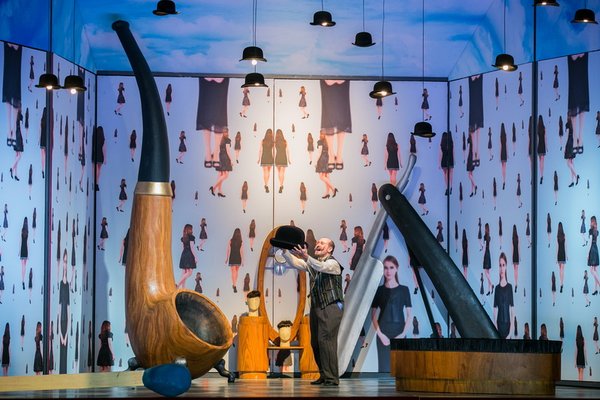
DON PASQUALE
12 August 2025, 7 p.m.
In Brief
Comic opera in three acts, in Italian, with Hungarian, English, and Italian subtitles
One of the best known farces in opera literature, Don Pasquale puts even the funniest films to shame with its situational comedy, colourful characters and sparkling humour. Its music is particular virtuosic: the famous duet between Doctor Malatesta and Don Pasquale makes for a perennial gala-night favourite. At the same time, delving a bit deeper into the story reveals that it is really about timeless human problems and desires, disappointments and disillusionments: an elderly gent longing for a mate, lovers yearning for a decent life, mistrustful kinsfolk, a money-hungry friend.
Csaba Káel's direction emphasises the eternal validity of the themes, showing the spectacular dramatic content at the heart of the situations, the fear of loneliness, the many faces of love, the tragedy which came within a hair's breadth of a happy ending. With nuanced devices of stylization, the production focuses on the timeless tale and its eternal relevance.
Details
- Location
- Hungarian State Opera
- Date
- Aug. 12, 2025
- Start time
- 7 p.m.
- End time
- 9:30 p.m.
Synopsis
Act I
Despite his advanced age, Don Pasquale is planning to get married. The marriage he's planing, however, is not motivated by love, but by meanness and the desire to take revenge against his nephew, Ernesto, who, currently the sole heir to his legacy, has also stubbornly resisted Don Pasquale's foolish demand that he marry the rich woman his uncle has picked out for him. This is because Ernesto is in love with the young and beautiful, albeit poor, widow Norina. Don Pasquale has had enough of the lad's disobedience and therefore decides to deprive him of his inheritance. And to get back at his nephew even better, he's also going to get married himself, since this will mean that Ernesto won't be able to ask for Norina's hand at all, since he won't have a penny to offer her.
Doctor Malatesta pretends to support Don Pasquale's ridiculous plan to get married, but in reality intending to teach the old man a lesson, he hatches a scheme.
Malatesta arrives at Don Pasquale's house with the joyful news that he has found an angel from heaven to be the don's bride, and she is none other than his own sister. Malatesta's description of the girl make her out to be so lovely, gentle and submissive that Don Pasquale falls in love with her at once, without ever having seen her. When Ernesto finds out that his friend Malatesta is assisting Don Pasquale, and is even going so far as to offer up his own younger sister to be his wife, he feels horribly betrayed. After writing a farewell letter to Norina, he prepares to leave the city.Since Don Pasquale has never seen Norina, Malatesta's plan is for her to play the part of his sister, Sofronia. Norina happily agrees to take part in the game, if it will help her become united with Ernesto.
Act II
Norina appearing before Don Pasquale is a modest girl from the countryside,who is mortified with embarrassment just to be in the presence of a man. Greatly smitten, the don signs over half of his fortune and full control of his estate to Sofronia in the marriage contract. Meanwhile, the unsuspecting Ernesto arrives, but before he can ruin the deception, Malatesta lets him in on the ruse. Now enjoying the power conferred on her, fake wife Norina turns Don Pasquale's life into infernal chaos.
Act III
Spending money left and right, Norina constantly humiliates the master of the house, even going so far as to slap the don, who is gradually becoming a shadow of his former self. When Don Pasquale finds a love letter addressed to Sofronia, it's the final straw. He regrets getting married and not allowing Ernesto to marry Norina. Malatesta comes up with some new trickery: he suggests that the don can free himself from his hellish marriage if he allows Ernesto and Norino to marry, since if another woman arrives in the household, Sofronia will surely withdraw. The uncle happily allows his nephew to tie the knot, even offering money for a dowry, if only he can be rid of his impossible wife. At this point, the schemers reveal the subterfuge. Don Pasquale forgives everyone: admitting his foolishness, he gives his blessing to the loving couple.
Gallery
Reviews
"It is a staging by Káel where the images and paintings that appear also have the role of analyzing and interpreting the story, and become coherent parts of the director's vision. Because there is one. Thanks to the singers, among the twentieth-century paintings chosen as the background and set elements, the scenes unfolded magnificently, with different feelings and emotions alternating."
Kolozsi László, Színház.net
